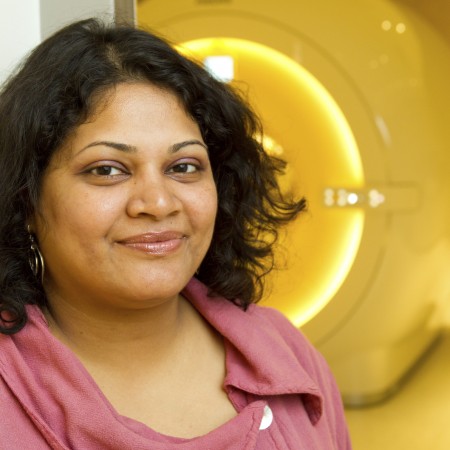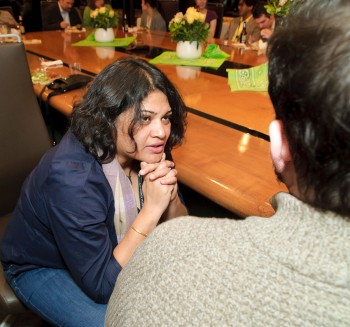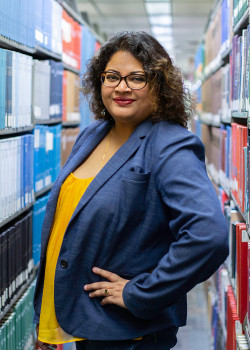
Chandramallika Basak
Research Interests: Attentional control and working memory, cognitive training strategies, neural and cognitive predictors of complex skill acquisition, and aging
972-883-3724
VP 8.15B
Lifespan Neuroscience and Cognition (LiNC) Laboratory
Curriculum Vitae
Professional Preparation
Syracuse University - 2005
Syracuse University - 2003
Syracuse University - 2002
University of Calcutta, India - 1998
Bethune College, University of Calcutta, India - 1996
Publications
Appointments
The University of Texas at Dallas [2011–Present]
School of Behavioral and Brain Sciences
Rice University [2010–2011]
University of Illinois at Urbana-Champaign [2008–2010]
Beckman Institute, University of Illinois at Urbana-Champaign [2005–2008]
Additional Information
Fellowships and Awards
2007 Early Career Researcher Award, Cognitive Ageing Conference,Australia
2005–2008 Beckman InstituteFellowship fromBeckman InstituteofAdvanced
ScienceandTechnology
2006 OutstandingDissertationAward,SyracuseUniversity
2006 Who’sWhoisAmerica
20042005 SyracuseUniversityTeachingFellow
2000,2004 SummerGraduateFellowship,SyracuseUniversityCurriculum Vitae Chandramallika Basak
2
19992003 SyracuseUniversityGraduateFellowship
2003 OutstandingTeachingAssistantAward,SyracuseUniversity
1998 Silver Medalist from University of Calcutta, India, for securing 2nd
rankinalluniversityM.Sc.(Psychology)examinations.
Personal Statement
Dr. Basak's research focuses on how and where in the brain we remember information over a short period of time; the interplay between attention and memory; and the effects of cognitive training, including video games and memory exercises, on the brain and cognition in both young and old adults. She is also investigating the effects of cardiorespiratory fitness on cognition.
Her honors include an Early Career Research Award at the 2007 Cognitive Ageing Conference in Australia, an Outstanding Dissertation Award and Outstanding Teaching Assistant Award from Syracuse University, and a Syracuse University Graduate Fellowship.
Dr. Basak earned a BS in mathematics and MS in psychology from University of Calcutta, India, as well as an MS degree in applied statistics, and an MS and PhD in experimental psychology from Syracuse University. Prior to moving to the Center for Vital Longevity in 2011, she was an assistant professor of psychology at Rice University. She also was a Beckman Institute Fellow and Research Scientist at the University of Illinois at Urbana-Champaign.
News Articles
Professor Basak Receives Grants from Alzheimer's Research Fund
The Darrell K Royal Research Fund for Alzheimer’s Disease recently awarded Dr. Chandramallika Basak of UT Dallas’ Center for Vital Longevity $165,000 in grants over the next three years for her research into mild cognitive impairment in older adults.Basak, an assistant professor in the School of Behavioral and Brain Sciences, is one of six researchers in Texas who received the grant. An outside panel of peers led by Dr. Ronald C. Petersen, director of the Mayo Clinic’s Alzheimer’s Disease Research Center in Rochester, Minnesota, made the selections.
CENTER LAB TO BEGIN STUDY USING FORM OF COGNITIVE TRAINING THAT COULD HELP PROTECT AGAINST ALZHEIMER’S DISEASE
DALLAS – Feb. 6, 2018 – Dr. Chandramallika Basak and her Lifespan Neuroscience & Cognition Lab (LiNC) at the Center for Vital Longevity have been chosen as a test site for evaluating a genre of cognitive training that may enhance brain plasticity and delay the onset or progression of Alzheimer’s Disease.In collaboration with the University of Iowa, Dr. Basak’s lab will be using a Posit Science Corporation cognitive training module to see what types of computer-based exercises might lead to significant and sustained cognitive benefit in healthy older adults, which may yield protective effects against Alzheimer’s Disease and other memory impairments.
Study Finds Training With Unpredictability Improves Memory Recall
 Memory training with unpredictable components could be more effective in enhancing episodic memory than training with predictable elements, according to new findings from UT Dallas researchers published in the journal Frontiers in Psychology.
Memory training with unpredictable components could be more effective in enhancing episodic memory than training with predictable elements, according to new findings from UT Dallas researchers published in the journal Frontiers in Psychology.Episodic memories are those associated with autobiographical events, such as a past birthday party or first trip to an amusement park. This type of memory is crucial to our ability to accurately retell stories.
PLAYING FOR KEEPS: VIDEO GAME TRAINING TO MAINTAIN COGNITIVE VITALITY
DALLAS – May 21, 2014 – The Center for Vital Longevity hosted two dozen DFW health and technology professionals committed to cognitive health as part of a social media “meetup” to cover issues related to aging.The group, “iACT,” which stands for “Innovation in Aging, Caregiving, and Technology,” listened to a wide-ranging talk that touched on the socio-economic burden of increasing cognitive frailty as the world’s population ages.
Dr. Chandramallika Basak, an assistant professor and one of CVL’s six faculty, presented findings about how certain video games are associated with improved cognitive performance.
Researchers’ Analysis Confirms Effects of Cognitive Training for Older Adults
 As more people live to advanced ages due to health care innovations, more also are dealing with the decline in mental acuity that can come late in life. Cognitive training is often touted as a way of treating — or even preempting — these issues, but there is significant disagreement on the effectiveness of various methods.
As more people live to advanced ages due to health care innovations, more also are dealing with the decline in mental acuity that can come late in life. Cognitive training is often touted as a way of treating — or even preempting — these issues, but there is significant disagreement on the effectiveness of various methods.Researchers from The University of Texas at Dallas’ Center for Vital Longevity (CVL) conducted a large-scale analysis of the benefits of multiple training types for individuals who are aging healthily, as well as those with mild cognitive impairment.
Dr. Chandramallika Basak, associate professor of cognition and neuroscience in the School of Behavioral and Brain Sciences, is the corresponding and first author of the study published in February in Psychology and Aging. She said her meta-analysis — which assessed the results of 215 previous studies published in 167 journal articles — will have a large-scale impact on a controversial field.